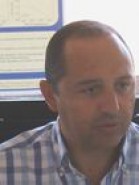abstract
The present study reports on the development of multifunctional plaster showing superior thermal insulation, ability to control the indoor RH and NOx photocatalytic degradation. The plaster contains TiO2 nanoparticles (1 wt.%) and 0-4 wt.% fibers of two distinct sizes: 1 mm < d < 2 mm (Fb(1-2mm)) and 2 mm < d < 4mm (Fb(2-4mm)). The formulations were adjusted based on flow table and rheometer tests, aiming to assure a desirable workability. Plasters with similar workability (spread on table) showed distinct yield stress values over time and Fb((1-2mm)) plays an important role on the workability control. Rheological behaviour was governed by Fb((2-4mm)). Binary mixture 2.0Fb(1-2mm) + 2.0Fb(2-4mm)2.0Fb(2-4mm) required less water amount to show the same workability of the single formulation 4.0Fb(1-2mm). However, the control of the rheological behavior over time was found difficult. The apparent porosity, water absorption and capillary index were strongly incremented with the rise of cellulose fiber concentration. Singular and binary samples present similar results and no significant differences were observed by changing the fibers size. Plaster's buffering capacity and NOx uptake was considerably improved by using cellulose fibers, being this increment primarily governed by the fiber concentration. Formulation containing 4.0 wt.% Fb((2-4mm)) revealed the optimal performance. (C) 2017 Elsevier B.V. All rights reserved.
keywords
PHOTOCATALYTIC ACTIVITY; CONSTRUCTION MATERIALS; RHEOLOGICAL BEHAVIOR; THERMAL-CONDUCTIVITY; HARDENED PROPERTIES; CONTAINING MORTARS; AMBIENT MOISTURE; INDOOR AMBIENT; CONCRETE; TIO2
subject category
Construction & Building Technology; Energy & Fuels; Engineering
authors
Senff, L; Ascensao, G; Ferreira, VM; Seabra, MP; Labrincha, JA
our authors
acknowledgements
This work was developed within the scope of the project CICECO-Aveiro Institute of Materials, POCI-01-0145-FEDER-007679 (FCT Ref. UID/CTM/50011/2013), financed by national funds through the FCT/MEC and when appropriate co-financed by FEDER under the PT2020 Partnership Agreement.





